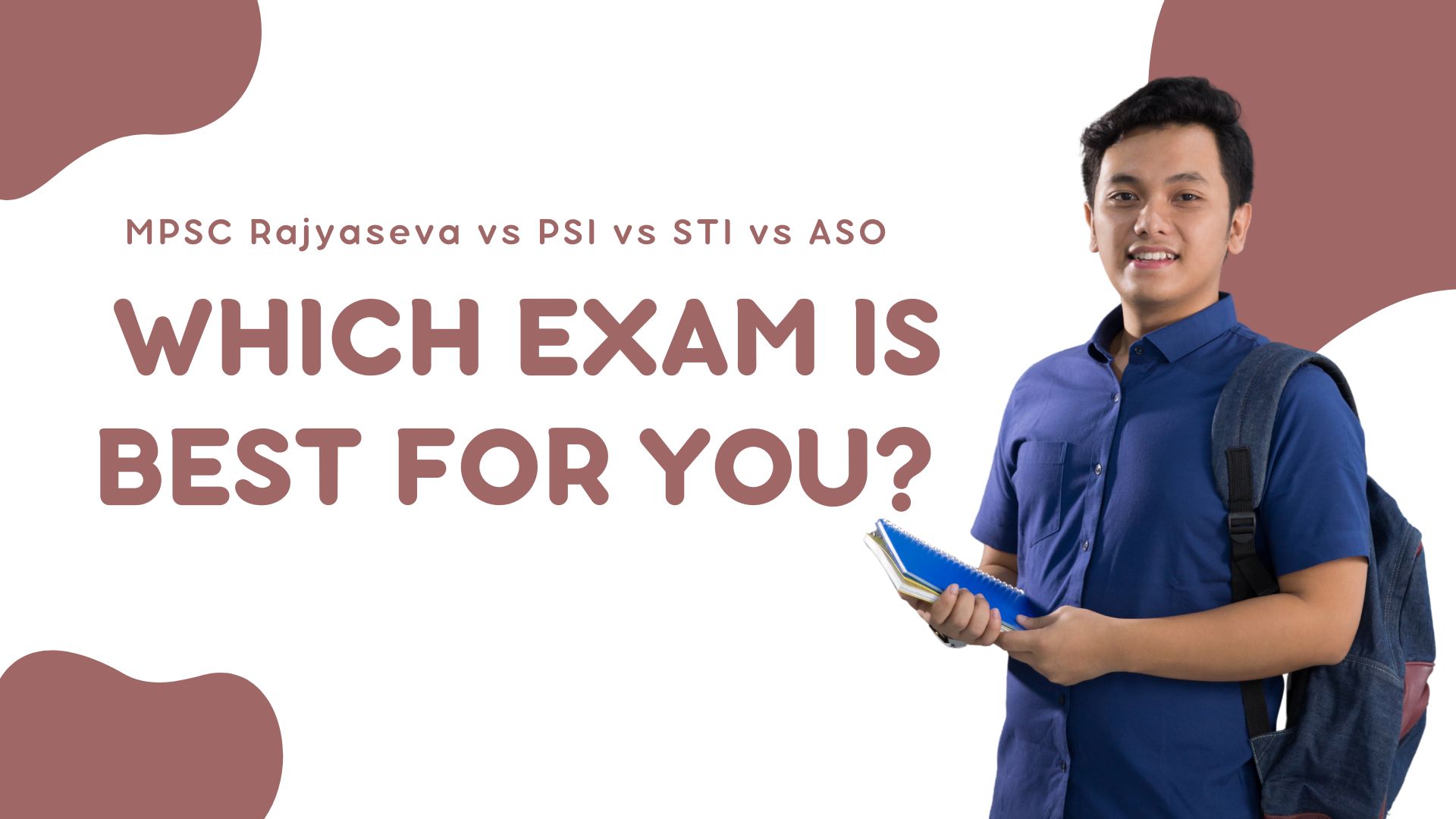It’s quite hard to choose between MPSC Rajyaseva, PSI, STI, or ASO Exams, as each of these exams leads to different career avenues in Maharashtra, and that makes it really important to understand how they’re different from one another.
The MPSC Rajyaseva is an entry point for administrative positions, quite prestigious, while PSI caters to the law enforcement arena. The STI is perfect if you want to get into revenue services, while the ASO works for various government departments.
So, what suits you best? That depends on your interest and career goals. In this article, this paper analyzes each exam, pinpoints the unique privileges each one holds, and reckons on which option fits in with your dreams.
As you explore your options, consider enhancing your preparation with the Best MPSC Classes in Thane, where expert guidance can make a significant difference in your exam success.

Overview of MPSC Rajyaseva Exam
The MPSC State Service exam opens the door for those seeking careers in the administrative branches of the Maharashtra government. It is not only an examination for the knowledge and skills of candidates, but it also serves as a career-deciding factor for candidates. Knowing the exam structure, eligibility, and possible career moves could give new life to eager aspirants.
Exam Structure and Phases
The MPSC Rajyaseva exam encompasses three different steps: Preliminary Exam, Mains Exam, and Interview.
- Preliminary Exam: The Preliminary Exam is the first stage of the selection process and comprises two objective papers. The preliminary exam tests general studies and various subjects. It acts as a filtering mechanism because only those who clear this test move on to the next stage.
- Mains Exam: There are six descriptive papers in the Mains, where candidates examine various subjects of Civil Services, Maharashtra history, and current affairs. This stage checks the analytical skills and writing skills of the aspirants with a wholesome evaluation of the subject knowledge.
- The final phase is a personal interview. Here, candidates will showcase their personality, communication skills, and overall suitability for administrative positions. It’s not just what you know, but how you present yourself.
Navigating through these phases requires structured and focused preparation. Many candidates find value in enrolling in MPSC classes in Thane to enhance their readiness.
Eligibility Criteria and Preparation
To be eligible for the MPSC Rajyaseva exam, candidates must meet certain educational qualifications. In general, a candidate should have completed a bachelor’s degree from an Indian recognized university. However, the age limits are mostly in the regime of 38 years from a lower age of 19 years for the given categories.
Preparation Tips:
- Understand the Syllabus: The first and foremost rule is to study the syllabus. This would help you focus your studies on the areas that will be tested.
- Study Material: Make use of the best study material available along with previous years’ question papers. This will give you an idea of the pattern of the exam and which questions were frequently asked.
- Regular Mock Tests: Sample tests may hugely boost a candidate’s confidence and time management during the actual exam. Institutions like CD Deshmukh provide tailor-made preparatory courses focusing on mock tests.
These tips would really help a candidate in preparation for the examination and would also help the individual to crack all the challenges thrown by this exam.
Career Opportunities after MPSC Rajyaseva
By clearing the MPSC Rajyaseva exam, candidates have several avenues to follow in the service of the government of Maharashtra. These may include the following positions:
- Deputy Collector: The involvement of this function refers to the administrative functions at the district level, with responsibilities regarding implementation and upkeep of several government projects and services to the public in a smooth manner.
- Block Development Officer: BDO is a pivotal figure in rural development, administering government schemes and programs at the very heart of the village.
- Excise and Taxation Officer: This post deals with taxation and excise laws, ensuring compliance with such laws, and raising revenues for the state.
Apart from these, the Municipal Commissioner and various other positions in public-sector undertakings are available.
These positions not only offer job security but also the opportunity to impact society positively. As you consider these pathways, engaging in focused preparation can maximise your chances of success in the MPSC Rajyaseva exam. Explore the Best MPSC courses in Thane to find resources that align with your aspirations.
Understanding the PSI Exam
The PSI exam is a key step in entering the police force in Maharashtra. As a PSI, you will be concerned about law and order, crime, and the safety of the people. Known about this exam will help your preparation as well as give you an idea of the duties and obligations of the job.
Key Responsibilities of a PSI
As a police sub-inspector, your role is manifold and highly significant. You will serve as an important link between the police department and the community. Here are some of the big responsibilities that you will be expected to perform:
- Law Enforcement: Acts directly in the enforcement of laws, the investigation of crimes, and the assurance of public safety.
- Supervision: Supervise constables and other subordinates in law enforcement operations.
- Investigation: Carries out investigations, collects evidence, and prepares case files for prosecution.
- Community Policing: Works with communities to establish trust and address local public safety issues.
- Maintaining Order: Managing crowd control during events or protests and intervening in public disturbances.
The function of a Public Service Investigator is about more than law enforcement; it is about serving the community, upholding justice, and creating a secure environment for each individual. This position demands leadership, communication, and legal skills.
Exam Pattern and Preparation Tips
Exam patterns must be understood for preparation. The PSI examination may include components as follows:
- Written Exam: Checks knowledge of laws and current affairs relevant for PSI, general studies related for PSI. It is mostly objective-type questions to test understanding and analytical skills.
- Physical Efficiency Test (PET): The candidate is tested on physical fitness by means of a timed run, long jump, or any relevant physical activity. Preparing for this will ensure that you reach the physical fitness standard required for the job.
- Interview: This is the last stage of the interview process where candidates demonstrate their communication skills and understanding of the profession.
Here are some recommended best practices that will help with your preparation for the PSI exam:
- Understanding the Syllabus: Get to know the exam syllabus so that you can focus your studies on areas that are more crucial.
- Study Material: A cocktail of textbooks, online resources, and previous years’ question papers must serve as your preparation program. Current affairs and a good knowledge of law are truly vital.
- Mock Tests: Time management during the exam is finely honed while writing mock tests frequently to put your understanding to the test.
- Being Fitness Conscious: The physical part must not be neglected; keep fitness training as a part of your routine to prepare for the PET.
Consider enrolling in the Best MPSC courses in Thane for expert guidance and resources that can streamline your preparation efforts. Engaging with qualified instructors and fellow aspirants can make a substantial difference in your readiness for the PSI exam.
